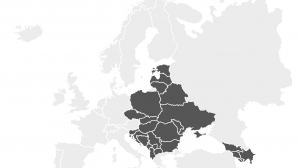Digital banking infrastructure for business in Russia, especially for large and medium businesses, still lags behind the mass retail segment, experts say. “In general, development of financial services and technologies for companies in our country, in my opinion, is in the early stages of formation. There are many different projects at declaration level, but they are still far from practical implementation,” said Vladimir Kozinets, president of the Association of Corporate Treasurers (ACC). If in retail banking, for example, in the field of remote servicing or mobile services, standard solutions are used in many respects, an individual approach is needed in each case for corporate clients. In the corporate segment, digital products require more money and time.
In small and micro-businesses, the situation is closer to the retail sector as digital solutions are easier to replicate for them. “There are a lot of offers for medium-sized businesses in Russia. There are even specialized digital banks for small entrepreneurs like Tochka, Modulbank, etc.”, says Maksim Nalyutin, head of the group leading provision of services to companies in the financial sector at Deloitte, CIS. Classic players like Sberbank, Raiffeisenbank, Otkrytie, PSB, etc. are actively developing new products for this segment. For example, there are debt capital platforms operating on the principle of p2b lending.
Scale Issue
In large banks, different departments are responsible for digitalisation of services for large and small businesses. “The approaches are very different, because the solutions for small and micro-businesses are much easier to scale, and the corporate request is a complicated and capital-intensive venture”, explains Evgeny Bogachev, head of Raiffeisenbank’s mid-sized business department. According to him, a large client needs a much wider range of online products – from simply opening an account and standard cash settlement services to servicing foreign exchange transactions, purchasing hedging instruments, currency control options, liquidity management tools, etc. The corporate sector today has a great need for the development of digital banking products, Vladimir Kozinets confirms: “First of all, it concerns payment services – single payment gateways, from host-to-host, via Transit 2.0, FMS (Financial Messaging System) and CyberFT; quick payment systems like C2B and B2B; various TMS (terminal network management system) options; as well as further development of digital factoring systems and trade financing.”
Today, there is a corresponding request from almost all sectors: trade, oil and gas, transport, etc., as Bogachev says. According to him, the largest corporations, many of which have already exhausted optimisation methods that lie in the “physical” plane, like staff reduction, show the greatest interest. Meanwhile, there is still a lot of untapped potential to reduce costs in the digital field. Given the scale of companies, any improvement through the use of digital products can have a tangible economic effect and reduce the cost of financial transactions. “Banking products are and will be in demand, which allows us not only to fulfill traditional tasks to attract financing, for example, but also to solve related business tasks in the most efficient way, like managing account balances for a group of companies”, adds Maksim Nalyutin. In May, for example, Raiffeisenbank developed a blockchain ecosystem specifically for the Askona Life Group, which automates and significantly reduces the cost of settlements with suppliers and customers. The solution is especially relevant for groups of companies and holdings to automate supply settlements, finance management, and large manufacturing companies for settlements with customers and suppliers, Bogachev added.

Artificial Intelligence and Big Data
In August 2019, the financial laboratory of VR Bank and the Skolkovo Foundation conducted a study to assess the digitalisation of the top 30 banks based on their digital projects scope in the first half of 2019. The results showed that the most advanced credit institutions (Tinkoff Bank, Sberbank, Alfa-Bank, Raiffeisenbank, and Ak Bars were in the top five) have been significantly ahead of competitors in terms of the level of digital infrastructure development.
According to the results of the study, 14 banks out of 30 provide an online legal entity account opening service, with only four offering online accountancy services. “It was also noted that large banks create their own subdivisions for developing fintech products, including for business. 17 credit institutions represented in the rating spend more than 10 percent of all operating expenses on research and development,” according to Roman Romashevsky, financial director of VR Bank.
In Raiffeisenbank, for example, as Bogachev says, a specialised unit has been created that actively interacts with external fintech companies. One of the tasks of this department is to search the market for interesting technologies and services. “Our experts collaborate with various innovative clusters, startups, and are located within the fintech community, while giving feedback to this community, suggesting what needs banks have, helping to ‘bring to mind’ good ideas. Adaptation of selected products to the necessary functionality and their implementation are then directly carried out by one or another specialized business unit,” says the expert.
As such, Raiffeisenbank developed a flexible framework for product development: “We either independently develop it or work with an external provider if we find the necessary solution in the market. We choose the fastest and most efficient way.”
The main incentives for the development of the corporate direction are toughening the competitive environment and growing demands from business clients like digital services, remote banking services (RBS) and various online platforms for corporations. According to Bogachev, all these topics are developing very quickly today. “When it comes to service, all banking clients are interested in speed and convenience. And it doesn’t matter whether the client is a private person or a legal entity. As individuals, users of modern devices already fully appreciate the benefits of digitalisation in banking services, and they are accustomed to use remote services and mobile applications,” he says.
Olga Morozova, director of the financial sector at ABBYY Russia, agrees with him: “Company managers and specialists are the same: they don’t want to spend hours in queues, manually filling in data and collecting information for banks, if they are going to open an account, draw up a salary project for employees or get a long-term loan for their company.”
Therefore, leading Russian banks, she says, are now actively implementing solutions for automatic processing and analysis of complex, unstructured documents, with natural language processing technology, computer reading and facial recognition in various combinations, and using artificial intelligence to personalise offers and services for entrepreneurs and organize remote registration of legal entities, including the use of smartphones. Mobile technologies help the banks’ business customers to automatically retrieve data from any documents – for example the payment of invoices. “It is important for businesses to start working with the bank as soon as possible. Something, which can be done three times faster, due to automation,” says Olga Morozova.
Focus on Remote Banking Services
Remote banking services (RBS) are most promising and relevant for development. “This is the most demanded service as a whole today. In many banks, including our bank, remote service is already very well established,” Bogachev comments. However, as the saying goes, there is no limit to perfection. A lot of different new needs are appearing on the market all the time. The main request from corporate clients for the future, according to Bogachev, is the maximum content of the bank-client system: detailing and analysing information about operations, connecting new products to the RBS system.
There are other interesting tasks. Thus, according to Bogachev, digital services for business credit are still far from perfect in Russia. One of the reasons is that the financial data in our country is still not transparent enough in comparison with foreign practice. There are open data of Rosstat, where all enterprises submit their financial statements once a year. The Federal Tax Service has announced plans to create a service for access to the quarterly financial statements of legal entities from 2020, but so far there is no detailed information on joining such a service on the market. “In the meantime, the problem is that relevant data are published with a delay of six to nine months. In addition, from the available data it is not always obvious how individual enterprises are related, and how large the businesses that they form are. In addition, the reports of individual entrepreneurs cannot be analysed remotely yet. And there are millions of them, and they are often a member of a particular group of enterprises,” he explains.
According to Bogachev, in addition to the “through-the-shop-window” products that the client sees, the digital “internal kitchen” is important for banks – with monitoring and analytics systems using artificial intelligence. Based on available data on the business and operations of a client in the bank, this work allows for improving the product offering, identifying the target needs of each client for the future, and forming a representative offer. For example, Raiffeisenbank is launching a new product – a pre-approved overdraft for corporate clients. Based on information about the cash flow on the client’s accounts, and using external data on the client’s financial condition, any existing arbitration cases, etc., the bank approves a certain credit limit. The client will be able to use the limit very quickly: it only remains to sign the bank’s offer and provide the latest financial statements.
Despite the fact that the development of B2B banking services is slower than B2C, today most fintech startups are focused on this area. According to Romashevsky, to enter the B2B market, a banking license is not required, nor are large investments in marketing, and therefore many fintech companies operate on the B2B2C model. In any case, according to ABBYY Russia, over the past six months, 29 per cent of projects using smart business technologies have been implemented in banks.
—





Add Comment